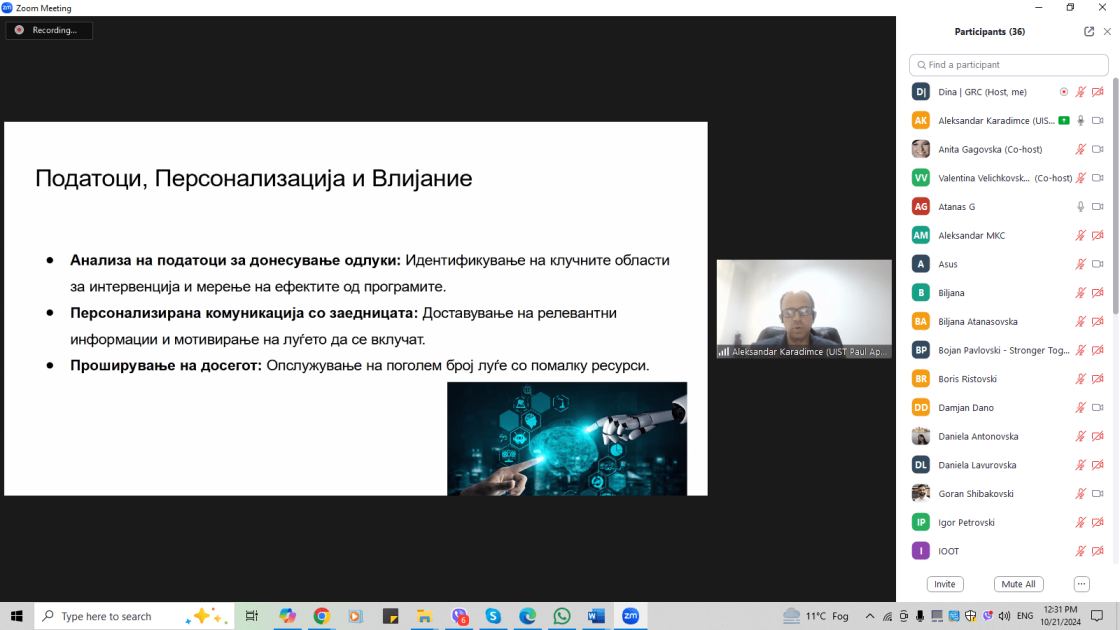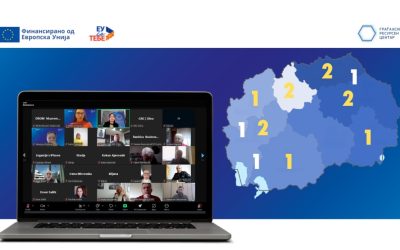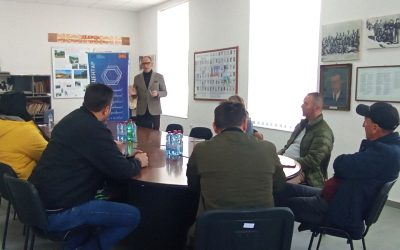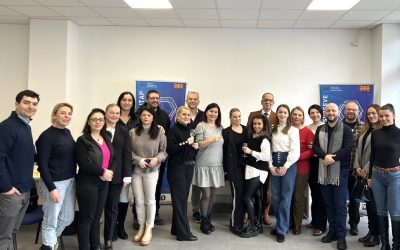“Digital transformation is not just a trend in global change, it is an opportunity to increase the capacity and impact of civil society organisations, which is possible only with joint efforts of the academic community, the business community and civil society organisations” was highlighted at the online debate on digital transformation of civil society organisations, organized by the project team “EU Support for the Civil Society Resource Centre – Phase II” on 21st October 2024 on the ZOOM platform.
The aim of the event was to open a discussion on the importance of digitalization, to present and discuss ways in which the civil society organisations (CSOs) can apply digital tools to improve their operations, transparency and impact.

“The role of artificial intelligence in improving civic participation and policymaking in the digital age and the application of artificial intelligence to improve social impact” were discussed by Prof. Dr. Goran Šibakovski, Dean of the Faculty of Applied IT, and Prof. Dr. Aleksandar Karadimče, Dean of the Faculty of Informatics and Communication Sciences at University St. Paul the Apostle Ohrid.
“It is essential to encourage organisations to use artificial intelligence tools, and not to perceive them as a threat to replace human jobs,” said Prof. Dr. Karadimče, emphasising that “it is the human who ultimately validates, approves and releases the content generated by artificial intelligence into public use.” In that process, Prof. Dr. Shibakovski added that “in addition to the professional aspect of the person validating the received content, one should always think about overcoming challenges related to ethics, privacy and its misuse.“

Prof. Dr. Monika Markovska from the Faculty of Information and Communication Technologies, University of St. Kliment Ohridski Bitola and President of the Association for Social Innovations VR Lab from Bitola spoke about the importance of IT solutions and social innovations in favour of increasing the impact and sustainability of civil society organisations. In this regard, as good examples, she highlighted the project for Skills Development and Learning Crafts in Virtual Reality, as well as the project for Digital Inclusion of Adult Roma, which contributed, through education in the field of IT technology and development of digital skills and competencies, to empower the adult population and socially excluded people to use available electronic services in their surroundings and to be better included in their communities and societies.
M.A. Atanas Godzoski, Director of the IT company Angor AG, presented several successful examples of digital transformation in the civil and public sectors, examples of successful digital solutions and social innovations in the field of telemedicine, innovative tourism, e-environmental protection and an e-tool for electricity protection, implemented in Macedonia and their impact on achieving significant changes.

Mr. Damjan Dano, digital transformation consultant and founder of Aqtos and IWM Network, spoke about the practical application of digital transformation tools and the potential of artificial intelligence in revolutionizing the work of CSOs, especially in the area of automation of repetitive tasks and freeing up time and resources for strategic initiatives, optimisation of work processes and personalized communication, as one of the ways to create stronger connections with constituents.
In the second part of the event, the attendees discussed the opportunities and challenges that organisations face in terms of digitalisation, mainly related to: ways to use digital tools in conditions where CSOs have limited resources, using the possibilities of working from “virtual offices”, as well as the ethics of using these tools, with special attention to the legal provisions related to the copyright of the used information sources.
Watch the recording of the debate “Digital Transformation of Civil Society Organisations”
The debate was organised under the EU-funded project “EU Support for the Civil Society Resource Centre – Phase 2” funded by the European Union. It is implemented by the National Civil Society Foundation – Civic Resource Centre, the Macedonian Center for International Cooperation, the Association for Democratic Initiatives – ADI, Gostivar and Media Plus, Shtip.





